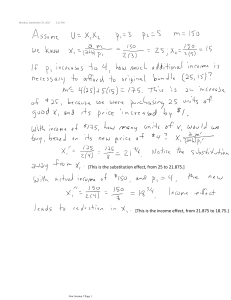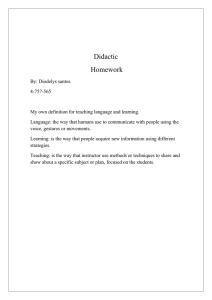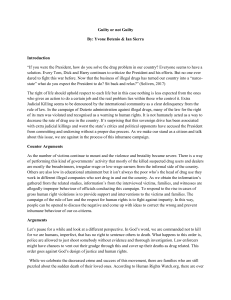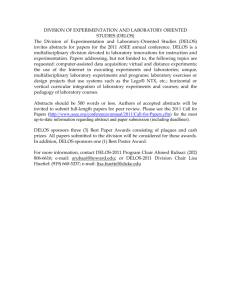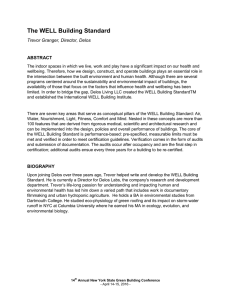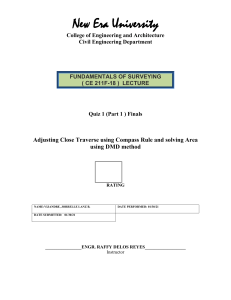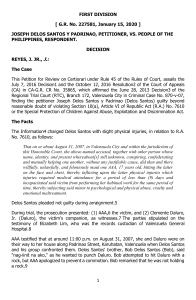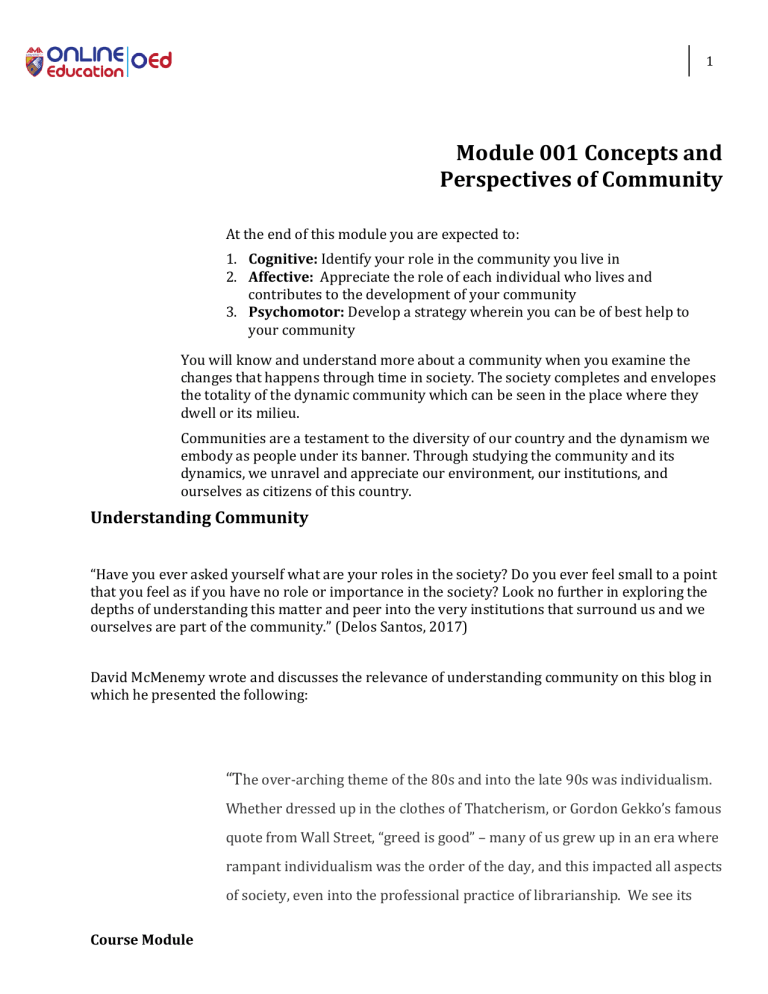
1 Module 001 Concepts and Perspectives of Community At the end of this module you are expected to: 1. Cognitive: Identify your role in the community you live in 2. Affective: Appreciate the role of each individual who lives and contributes to the development of your community 3. Psychomotor: Develop a strategy wherein you can be of best help to your community You will know and understand more about a community when you examine the changes that happens through time in society. The society completes and envelopes the totality of the dynamic community which can be seen in the place where they dwell or its milieu. Communities are a testament to the diversity of our country and the dynamism we embody as people under its banner. Through studying the community and its dynamics, we unravel and appreciate our environment, our institutions, and ourselves as citizens of this country. Understanding Community “Have you ever asked yourself what are your roles in the society? Do you ever feel small to a point that you feel as if you have no role or importance in the society? Look no further in exploring the depths of understanding this matter and peer into the very institutions that surround us and we ourselves are part of the community.” (Delos Santos, 2017) David McMenemy wrote and discusses the relevance of understanding community on this blog in which he presented the following: “The over-arching theme of the 80s and into the late 90s was individualism. Whether dressed up in the clothes of Thatcherism, or Gordon Gekko’s famous quote from Wall Street, “greed is good” – many of us grew up in an era where rampant individualism was the order of the day, and this impacted all aspects of society, even into the professional practice of librarianship. We see its Course Module remnants today, calls to be entrepreneurial, calls for leaders to take us into new eras of success, and a mistrust generally of professional bodies and collectives that seek to further the interests of the many rather than individuals. All are remnants of an era that coloured our worldviews based on the notion that the individual was the ultimate moral arbiter, for good or ill. There has been an ongoing change in the air, however. In political philosophy there was early concern in the mid-80s with the atomisation of society and the worry that individualism was robbing society of important things such as family, community, country, and the like. Key authors such as Michael Sandel and Alasdair MacIntyre sought to challenge the idea that we are little more than individuals, all seeking to promote our own interests first and foremost, with no link to any past or community. As MacIntyre put it, “the concept of a person is that of a character abstracted from a history”. However, it is how community is interpreted by governments that will colour our practice for the foreseeable future. In the UK context, we see a very specific form of community emerging from the governments of 2010-2015, and 2015 onwards at Westminster. Communities now, rather than individuals, are the ultimate moral arbiters, and thus follows the argument we must now seek to empower communities as decision-making bodies. This is no mere cosmetic exercise; in the context of the modern era in England we see communities handed libraries and schools to run, with little or no state intervention. As this blog is not focussed on volunteer libraries/closures, I will not comment on that aspect in this piece, but the government would argue that the communities are empowered, given responsibility, and in doing so we are immediately in a new political and professional paradigm. One that raises significant challenges for our practice (notwithstanding the impact of the closures/volunteer aspect). With empowered communities, we need good information provision in order that decisions made by those responsible within the communities are 3 informed. Communities can be all shapes and sizes, all demographic groups, all religious and cultural groups, and the dangers of no central body setting universal standards are clear and present. Quality and standards could suffer; censorship could become an issue if communities begin to be dominated by one cultural or religious group over others. The dangers of postcode lotteries, fragmentation of services, and a weakened collective library experience are issues we need to be prepared for and ready to address as a profession. The empowered community is the next stage of how governments will wish services to be delivered. We need to be at the forefront of that thinking as it applies to libraries and information, and not reacting to failure or dysfunction.” The Living Commune “The word community in its literal form is defined by two characteristics: location and social identification. First, a community can be defined simply as a group of individuals bound with a specific geographic location. It means that a group of people living in a specific area can already be called a community. The second definition surmises that a community is an example of collective that identifies common traits, goals, or customs. It can be argued that communities bind individuals into a collective whole.” (Delos Santos, 2017) “A community is a living social entity and goes beyond the old categorization of space as its primary definition. More than a space, a community is made up of people; you and I. Much like living organism, you may think of people as living cells that make up an organic being. People within the community act in the same way and of same importance. Like cells, we need each other to support life. Our society itself has life, has vibrancy, and every single one is as integral to support this structure as everybody else. Just like an organic being, a community is in, molds the collective in accordance to the demands of survival. While the composition of the community is by default created by the personalities therein, the environment, on the other hand, shapes it to its most optimal social composition and form. This synergy between the self, community, and the environment seems to be organic; yet practice, this is the challenge that confronts all communities in general. The main obstacle is to compromise all these actors, trivialities and circumstances into an effective social machinery composed of living parts.” (Delos Santos, 2017) Course Module The Basics of a Community “When we think of a community, we think of how people come together to form a singular faction. We see it as a structure that is made of individuals bound by something abstract and unforeseen. It is not as simple as such, as the community is bound because of self-help. The concept of self-help is about how individuals seek personal development without the help of others. However, self-help defines a community once each individual wants and need intersect, therefore justifying a need of unify. It is assumed that people are bound to seek self-help in their own lives, and in their own journey, find common avenues for cooperation and partnerships among others and therefore lay the foundations for capacity-building" (Delos Santos, 2017) “However, not everyone sees it as such due to the varying sense of community ownership that its members may possess. Ownership, in this sense, is the level of commitment and accountability that an individual has for community. This can be summed up by the level of involvement the community and its members hold in the most basic operational structures of the commune. Some of these structures can be government or non-governmental, and formal or informal. These social categorizations bind individuals and groups toward specific goals, concerns, and issues. Problems within communities are shared just as resources and opportunities. We must never forget we are all stakeholders and are bound by the same fate of the commune. Ownership, some may argue, is a choice but in reality, ownership is a necessity for the members of the community if they aspire to improve their current situation.” (Delos Santos, 2017) “Through community participation, individuals can provide their own contributions through acts of volunteerism in projects and other communal initiatives. More so, participation is not only focused on being part of an ongoing project but an individual should also be an active member by taking part in the managerial and organizational development of the community, which includes the conceptualization, planning, operationalization, and review of initiatives. Existent communal models of direct participation include town halls, focus group discussions, forums, and through informal channels which can include everyday affairs. An active community is one of the most important facets of healthy community because it characteristically directs issue discourses into tangible and structured dilemmas that can be solved and operationalized via pragmatic and sustainable solutions created by the combined efforts, ideas, expertise and experiences of the group.” (Delos Santos, 2017) “While participation is the key, inclusion is one aspect of the community that is integral in binding the collective into a whole. As a form of social assembly, the personalities within a community are different and unique. In respect to culture, race, religion, and other identifiable social identities, one person is unique as to the other. Such backgrounds, histories, mores, and customs vary and yet should be integrated into the local communal social fabric. Moreover, inclusion echoes the need for the community to be compromising and tolerant of these differences. A community should always consider not only the needs of the majority but more critically, the needs of the minority that are often neglected or overlooked. This can be solved by using more objective instruments of inquiry and a wider view that reality exists outside the confines of the majority. Inclusion is all about conciliation that reaches beyond norms of collective understanding wherein the goal is to reach social equality among its members.” (Delos Santos, 2017) “Highlighting inclusivity are access and equity. These two are the goals that a commune must strive for to create a better society. Access and equity imply the ease in which various individuals and groups can attain the basic necessities and resources. They push for a just allocation of goods and opportunities that is without discrimination and prejudice toward people. Significantly, they provide power and social protection among its citizens through the continued 5 improvement of its structures under political, economic, sociocultural, technological, legal and environmental aspects.” (Delos Santos, 2017) The Community as a Movement “A community is more than just a collective. It acts much like a living entity that takes on life. Living within the imagination of its members, a community also embodies a perspective, identity, and stand, much like a social movement. The main difference between both is social movements exists primarily of a cause that manifests either as a reaction to an event or as a preexisting popular rhetoric among the community members, while a community is bound not just by one issue or narrative but on a plethora of compromises that are commonly accepted and continually reinforced. To put it simply, a social movement is more issue-specific and may exist primarily for its own purpose, while a community may embody several social movements within its own ecosystem. To look deeper in its dynamics, let us focus on its important ideals and how it comes to fruition. Through issues and concerns that are shared among its members, advocacies are formed by the community and its leaders. To improve and garner support, communities try to garner support from other individuals or groups which are aligned to their worldview. As compared to social movements, communities are made up of various advocacy clusters that try to supplement the ongoing efforts of the government. Advocacies include multitudes of topics where people are compelled to push for value-specific agendas that are shared through their supporters. Formations are created with the organic networking of actors that later on find commonalities and avenues for cooperation and partnerships. Underpinning these efforts is the spirit of collaboration where groups and individuals from various walks of life come together from linkages that are important for mobilization and value creation. The creation of these networks is also both formal and informal since there is really no limit to where collaboration can happen or manifest. Partnerships can take from between individuals or groups of various backgrounds that shared a common identification, but at the same time, contribute on different levels to solve problems and overcome obstacles. Embracing this kind of diversity is critical in building networks that last and work under various circumstances and challenges. Standing on the foundation of advocacies and networking is the hope for social action. At the end of the day, the community hopes to address the issues of the status quo through the combined efforts of actors. Planning, conceptualization, operationalization, and implementation of action will not be possible without the political will of actors toward meeting general compromise to effect social change. The community is a movement that cannot be dismissed as external to realities that we hold our own. We are, in fact, the community; our personal worldviews and realities are directly derived from collective with which we identify ourselves and in sharing a common identity, we also share the same fate.” (Delos Santos, 2017) Definitions of Community “Communities are diverse. They are never static entities that are simplistic and narrow. The interpretation itself of what a community is has been debated by social scientist and thought leaders. The diversity of a common idea exposes the narrative that is vibrant and ever changing or evolving until this day. The constant struggle to find identify in the science of Course Module communities is dependent upon the context used. The different branches of knowledge look into the subject of communities in varied ways as lenses of inquiry shift on every direction with the slightest change on technical term or environment. The community and the foundation of meaning we use to discuss communities must be an understanding for their real world.”(Delos Santos, 2017) Resources: 1. Delos Santos, DL. S.R; Community Engagement, Solidarity, and Citizenship (1st Edition).; Philippines : Rex Bookstore Incorporated. 2. The Importance of Understanding Community;https://www.cilips.org.uk/importance-understanding-community/; February 2019

